Classic Commentaries and Studies on Joshua (17 vols.)
Digital Logos Edition
Overview
After following the Israelites through their 40-year exodus, the book of Joshua offers a brilliant ray of hope as they finally lay claim to the “land flowing with milk and honey.” Though often viewed as a strictly historical document chronicling the Israelite’ conquest and division of the Promised Land, the book actually offers much more in the way of allegory and foreshadowing, setting up Joshua as an archetype for the coming Messiah.
Classic Commentaries and Studies on Joshua offers more than 4,000 pages of interpretation, observation, translation, contextual history, reflection, and practical application. A rich and varied collection, it marries accessibility and scholastic richness.
This collection is essential for students, scholars, pastors, historians, teachers of the Bible, and anyone else studying the book of Joshua. With Logos Bible Software, the collection is completely searchable—Scripture passages appear on mouse-over, linking to your favorite Bible translation—Greek, Latin, or English. Perform powerful searches by topic or Scripture reference—finding, for example, every mention of “courageous” or “land.”These texts are more powerful and easier to access than ever before.

- More than 4,000 pages of scholarship on the book of Joshua
- Notable contributing authors from a variety of backgrounds
- Completely searchable content linking to your favorite Bible translation and to the other books in your library
- Title: Classic Commentaries and Studies on Joshua
- Volumes: 17
- Pages: 4,156
This title is included in the following collections
You can save when you purchase this product as part of a collection.
Logos 8 Collector's Edition Le...
$11,399.99$11,399.99Logos 9 Collector's Edition Le...
$11,399.99$11,399.99Logos 8 Ultimate Legacy Librar...
$21,749.99$21,749.99Logos 9 Ultimate Legacy Librar...
$24,999.99$24,999.99
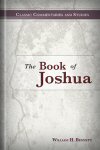
William Henry Bennett’s translation of The Book of Joshua creates a composite work sourced from multiple ancient Hebrew documents—a robust and multi-dimensional view of this Old Testament book. Bennett’s careful scholarship is replete with explanatory and marginal notes and illustrations, and he adds to the text with a brief history. Scripture translated from anything other than the “authorized version” is color-coded in the text, giving readers insight into the translation’s origins.
William Henry Bennett (1855–1920) was a professor of Old Testament exegesis in New and Hackney Colleges in London, a fellow of St. John’s College in Cambridge, England, and a lecturer in Hebrew at Firth College in Sheffield.
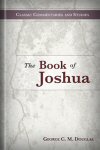
In a concise yet authoritative introduction, George C. M. Douglas discusses the issues of authorship, dating, and geography that influence our understanding of the book of Joshua, shedding light on the origins of this ancient text. Douglas’s work includes an in-depth verse-by-verse commentary that explores the book in the context of its historical roots—as well as questions for further study and devotional purposes.
George C. M. Douglas (1826–1904) was educated at the University of Glasgow and at New College in Edinburgh before becoming pastor at Bridge of Weir from 1852–1857. Douglas later became professor of Hebrew at Free Church College in Glasgow, Scotland. Douglas’ familiarity with German, French, and English gave him a wide scope of understanding for his various works including The Book of Judges, Isaiah One, The Book of Jeremiah, and The Six Intermediate Minor Prophets.
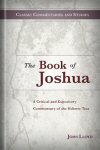
John Lloyd examines the book of Joshua as a literal, prophetic, and spiritual history of the Jewish people. In The Book of Joshua: A Critical and Expository Commentary of the Hebrew Text, he explores the idea of Joshua as an archetype for the coming Messiah—and the journey to the promised land as a mirror for entry to heaven.
Lloyd’s commentary is divided into two parts: the conquest of the land and the division of the land. The verse-by-verse commentary comprises grammatical, exegetical, historical, and ethical notes that mine the depths of this early prophetic work. It also includes an index of geographical names.
John Lloyd was the rector of Llanvapley, a village in Wales.
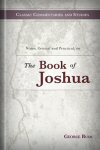
Drawing on the wisdom of notable Christian and Jewish commentators of his time, as well as his own insights, George Bush provides a detailed commentary on the book of Joshua. He examines the book in context and studies the original Hebrew, employing every effort to break the book down verse-by-verse and reveal the heart and soul of God’s purpose through Joshua.
George Bush (1796–1859) studied theology at Princeton University before being ordained in the Presbyterian ministry. He was a professor of Hebrew and oriental literature at New York University.
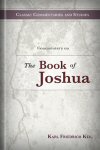
Taking the common line of dividing the book of Joshua into two parts—the conquest of Canaan and the division of the land— Karl Friedrich Keil pays special attention to this early prophetic work, examining its origins, credibility, and impact on the rest of the canon. Keil explains his methodology and approach in an extensive introduction, exploring authorship and etymological roots in order to better build a foundation for his verse-by-verse explication.
Karl Friedrich Keil (1807–1888) was a German Lutheran Old Testament commentator.
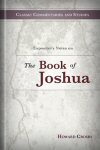
Howard Crosby carefully elucidates the book of Joshua through commentary and analysis. Taking the Old Testament book verse-by-verse, he examines the nuances of the text and succinctly yet authoritatively renders it useful for readers. He refrains from criticism in the main body of the work, choosing instead to elaborate on his thoughts in a series of appended notes.
Howard Crosby (1826–1891) was an American Presbyterian preacher, scholar, and professor.
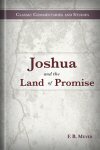
Patient consideration of the contents of Scripture will inevitably reveal the heart of God for his people, and F. B. Meyer has scrupulously studied the book of Joshua in hopes of obtaining such truth. His objective, to parallel the conquest of Canaan with the experiences of the individual Christian, resulted in Joshua and the Land of Promise, a 22-chapter treatise on the Israelites redemption from exile into the Promised Land. He explores the spiritual symbolism and significance of this physical respite for the Israelites as well as its connection to the other promises God holds for his people.
F. B. Meyer (1847–1929) was a Baptist pastor and evangelist in England. He wrote over 40 books, including Christian biographies and devotional commentaries on the Bible.
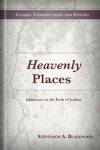
In Heavenly Places: Addresses on the Book of Joshua, Stevenson A. Blackwood carefully and intricately weaves the Old Testament book of Joshua into New Testament theology, exploring the Israelites’ conquest and settling of the land through nine motifs that draw us back to the coming Messiah. Each address faithfully examines the people of God in the context of the promise of God, revealing how this redemption story foreshadows the work of the cross.
Stevenson A. Blackwood (1832–1893) was the major founder of the Civil Service Prayer Union and the author of Forgiveness, Life and Glory : Addresses.
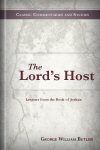
History is the foundation upon which doctrine rests. Understanding the history of God’s people is essential to understanding the purposes of God and his saving grace. In The Lord’s Host: Lessons from the Book of Joshua, George William Butler shows readers how the providence of God for the Israelites enables us to understand our dependence on Christ. These “precepts embodied in practice” are compiled in a series of lectures that focus on enforcing the spiritual and practical lessons found in Joshua and the history behind the events themselves.
George William Butler (1819–1890)was an English divine and schoolmaster.
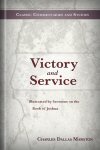
Charles Dallas Marston’s sermon series on Joshua seeks to show what rich spiritual lessons can be gathered from one of the most strictly historical books of the Old Testament. In Victory and Service: Illustrated by Sermons on the Book of Joshua he examines Joshua’s unwavering devotion to the Lord in light of the struggles of Israel as the Israelites overtake Canaan and put down roots. Marston provides a brief history of the tribes the Israelites had to conquer to lay claim to their promises, and expounds on the trials and victories God’s people faced in their journey to and through the Promised Land.
Charles Dallas Marston (1824–1876) was the rector of Kersal from 1866 to 1873 and the author of several theological works.
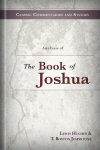
In a work created to help Cambridge and Oxford students prepare for their examinations, Lewis Hughes and T. Boston Johnstone provide a thorough and straightforward analysis of the book of Joshua. Hughes and Johnstone offer a comprehensive history of Joshua’s background and calling, and an exposition of the book itself. Complete with critical notes and study questions, Analysis of the Book of Joshua is an excellent study aid for exploring the depths of this historical book.
Lewis Hugheswas a professor at Corpus Christi College in Cambridge.
T. Boston Johnstone was a professor at St. Andrews in Scotland. He is also the author of a number of commentaries on Old Testament books.
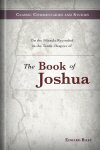
Edward Biley presents a critical and scientific inquiry into the day the sun and moon stood still during the battle at Gibeon. Examining contextual clues, historical records, and geological studies, Biley seeks to make sense of this highly debated miracle.
Edward Biley attended Clark College in Cambridge.
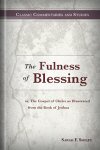
In The Fulness of Blessing; or, The Gospel of Christ as Illustrated from the Book of Joshua, Sarah F. Smiley examines Joshua’s leadership of the Israelites as a foreshadowing of the Messiah to come. Establishing him as a “type,” Smiley explains how Joshua fits into the kaleidoscope of God’s intent for mankind, thus revealing the larger, fuller vision of his blessings.
Sarah F. Smiley was a renowned Quaker minister, preacher, and author.

S. Holmes’ exhaustive investigation of the Hebrew and Greek texts of the book of Joshua examines the discrepancies between the Masoretic Text and the Septuagint. He zeroes in on the nuances of language and the omissions that might easily be passed over in other studies, highlighting the significance of these alterations to the work as a whole.
S. Holmes was a lecturer in theology at Jesus College in Oxford.
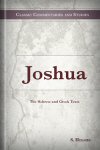
The Conquest of Canaan, Lectures on the First Twelve Chapters of the Book of Joshua is a collection of 30 lectures from A. B. Mackay. His sound exegesis focuses on the Israelites’ imminent conquest of Canaan and the lessons to be learned from this people’s dealings with God as they pursue his promises. This volume also includes “The Death of Moses,” a poem by McKay.
A. B. Mackay (1842–1901) was a Presbyterian pastor who led Crescent Street Church in Montreal for 25 years.
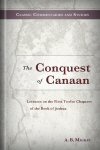
The book of Joshua’s exhortations to live a life of faith and fullness found in the book of Joshua are timeless. Finding this call to action applicable to Christians through the ages, H. Forbes Witherby has created a painstaking exegesis of the text, connecting it to the teachings of Ephesians and Colossians, in order to elucidate the underlying implications of the Messianic “type” seen in Joshua.
H. Forbes Witherby also authored The Gospel of Our Salvation and The Child of God.
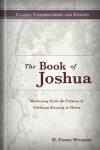
Thornley Smith’s work creates a comprehensive overview of the book of Joshua the man, producing a vivid biography of the life and times of Joshua. Chapter by chapter, Smith unearths customs, traditions, and the layout of the land as the Israelites move forth in their conquest. His detailed and fluid descriptions paint a brilliant picture of this era in biblical history, offering a richer view of a traditionally straightforward historic book.
Thornley Smith (1813-1891) was minister at Cradock Methodist Church in Grahamstown. He designed the “Methodist Cathedral” in Grahamstown, South Africa.
Reviews
7 ratings

M. David Johnson
3/27/2015
AeliusCicero
4/15/2014

David Leslie Bond
11/20/2013

Larry Proffitt (I
11/13/2013

RICHARD A. RAY
10/23/2013
Eduardo Vega
9/25/2013

Grover Cleveland Edwards
8/19/2013